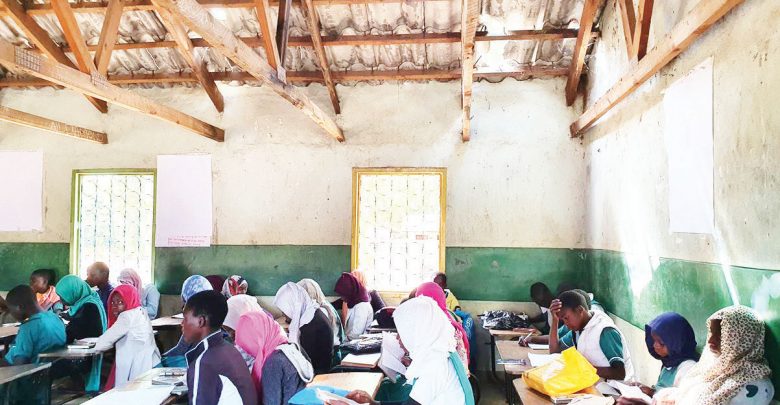Africa-Press – Malawi. The scramble for one toilet among 1,000 female learners at a primary school in Mangochi is forcing them to opt for nearby bushes. As THOMAS KACHERE highlights, the problems do not end there.
School dropout rates among girls in Malawi remain high. Several factors, including disturbances in menstrual health, contribute to the problem. Failure to access sanitary materials and facilities can also compel girls to miss classes for nearly a week each month, depending on their cycles.
At Nampinguja Primary School in Mangochi South East, over 1,000 female learners rely on one toilet, which is often unhygienic due to day-to-day overuse.
A standard seven learner at the school, Khadija Usi, says the development is affecting their education as some of the girls choose to stay away from school, usually when menstruating, while others opt for bushes to escape the stench in the lone toilet.
“There are also times when the toilet is always busy. It is not always possible to wait and the bushes become the last resort.
“Learners whose homes are closer to school rush there when they want to relieve themselves. It is a very big problem,” Khadija says.
The school’s head teacher Edina Maulidi is worried that, as girls miss classes due to sanitation challenges, poverty levels will continue to rise in areas surrounding the school.
Her supplications go to well-wishers who can assist with materials for the school committee to construct more toilets. On top of the sanitation challenges, classroom blocks— constructed over 40 years ago— have cracks running down walls and broken roofs.
When rain falls, classes get dismissed without a second thought. “We have been trying to solve the problems on our part and the school’s management collected about K910,000 from parents but the money is not enough. We have so many issues to sort out at the school,” Maulidi says.
She admits that dozens of girls abscond classes when they are menstruating, a development that affects their performance in class. The school head wants the matter to be treated as a serious one to avert a possible education crisis among learners around the school.
Nampinguja Primary School Management Committee Secretary, Modester Chalimba, is worried that the condition of the school blocks is a disaster waiting to happen. The cracked walls and broken roofs may finally give in to heavy winds and rains, causing damage to lives of learners.
Already, since four learners at Natchengwa Primary School in Zomba District died three years ago after a classroom wall collapsed on them, there had been concerns that a similar accident may happen in other schools whose infrastructure does not meet the minimum standards.
Slightly a year later, one boy died while two others were injured after a classroom wall fell on them at Fumbi Primary School in Mwanza District. Chalimba prays Nampinguja Primary School will not be next on the list of schools where learners get injured or lose their lives after classroom walls collapse.
Even the fact that girls’ education is being affected by inadequate sanitary facilities is a big concern to her. Executive Director of Civil Society Education Coalition, Benedicto Kondowe, has described the situation at the school as a huge setback in efforts to promote girls’ education in Malawi.
“Every child has the right to education and the government has the obligation of ensuring that this right is accessed and protected.
“We are, therefore, asking the government and well-wishers to come in and help the school because wherever a school is located, its learners must enjoy rights just like everyone else in the country,” Kondowe says.
His sentiments are shared by Girl Child Education Movement Executive Director Marshall Dyton, who charges that learners should not be exposed to conditions that will result in failure in attaining their education goals.
Dyton wonders whether efforts to keep girls in school will be successful if some of them stay away from school when menstruating. “No girl should fail to complete their primary education because of the condition of their schools. Girls must get all support necessary for their full participation in class,” Dyton says.
On sanitation challenges at Nampinguja Primary School, health rights activist Maziko girls may be exposed to waterborne diseases such as cholera, especially during the rainy season. Matemba warns that
“A place where many people assemble routinely should have adequate sanitary facilities. Duty-bearers should come in and address the problem. Lives of girls are at risk,” Matemba says.
In its report on ‘Wash in Schools’ released last year, United Nations Children’s Fund concluded that every child has the right to a quality education, which includes access to drinking water, sanitation and hygiene (Wash) services while at school.
“Children spend a significant portion of their day at school where Wash services can impact student learning, health and dignity, particularly for girls.
“The inclusion of Wash in schools in the Sustainable Development Goals (targets 4.a, 6.1, 6.2) represents increasing recognition of their importance as key components of a ‘safe, non-violent, inclusive and effective learning environment’ and as part of ‘universal’ Wash access, which emphasises the need for Wash outside of the home,” the report says.






